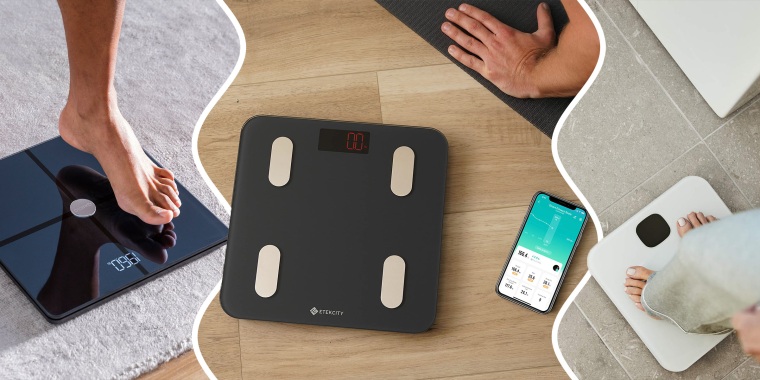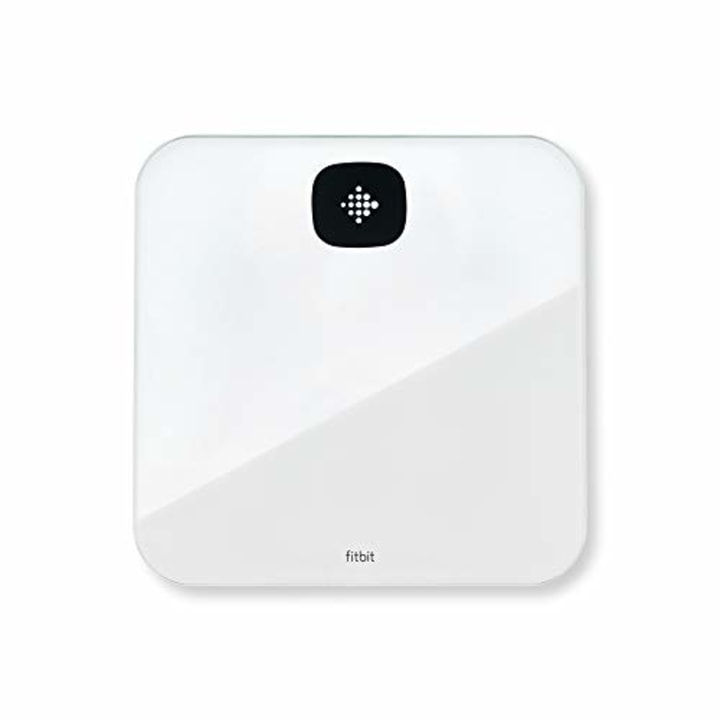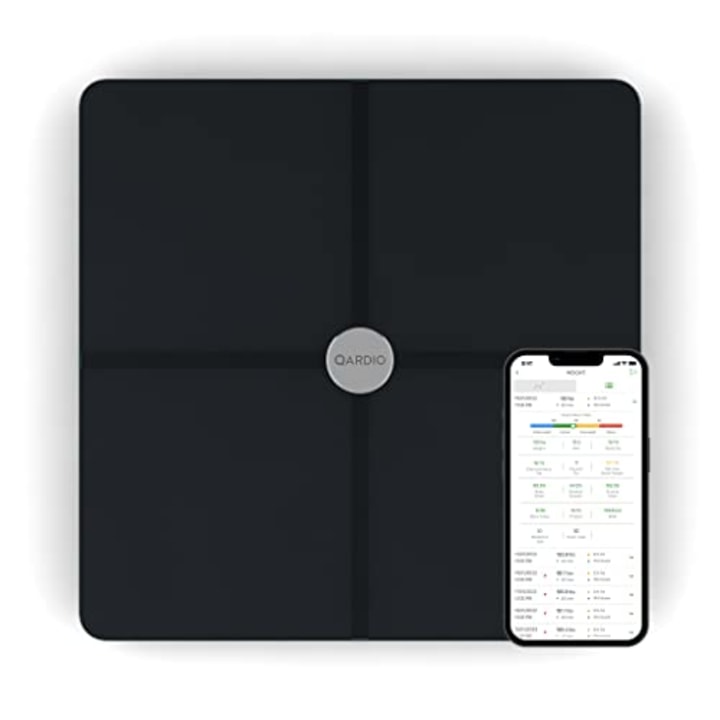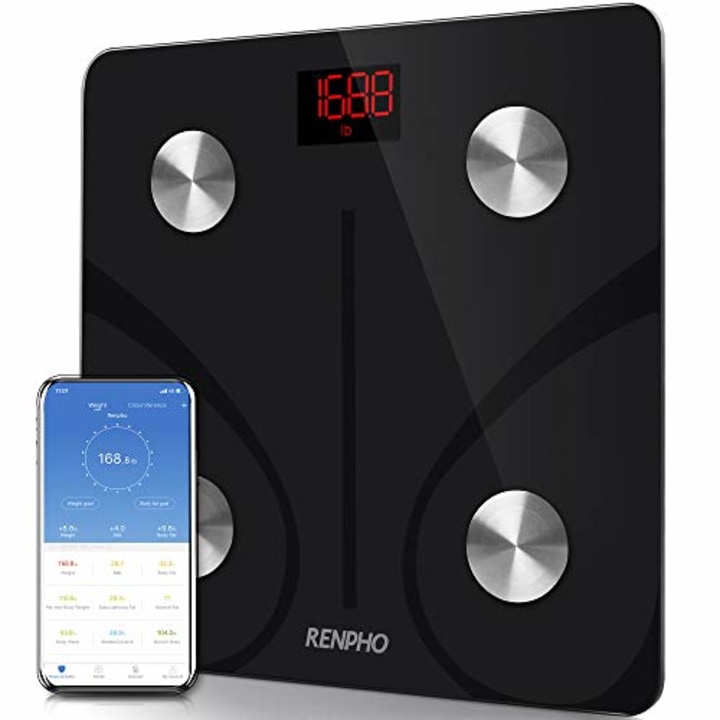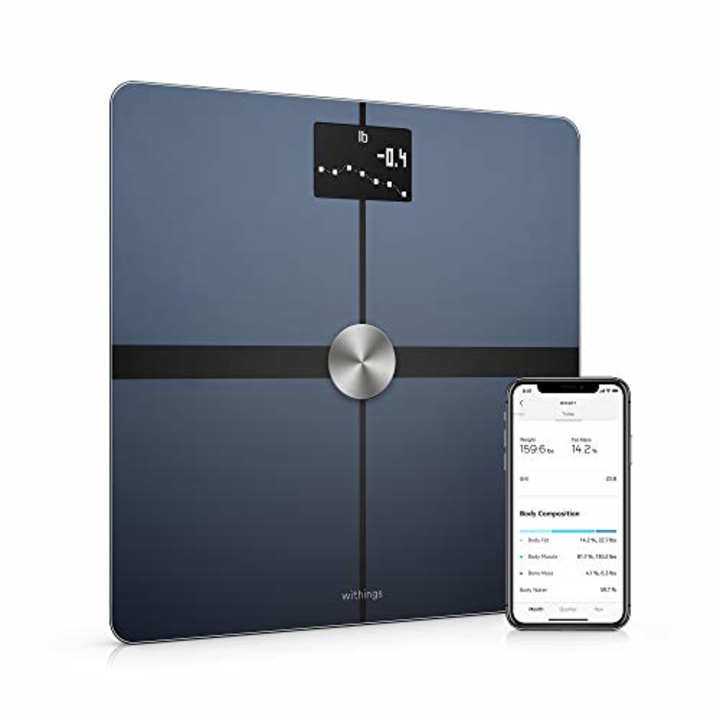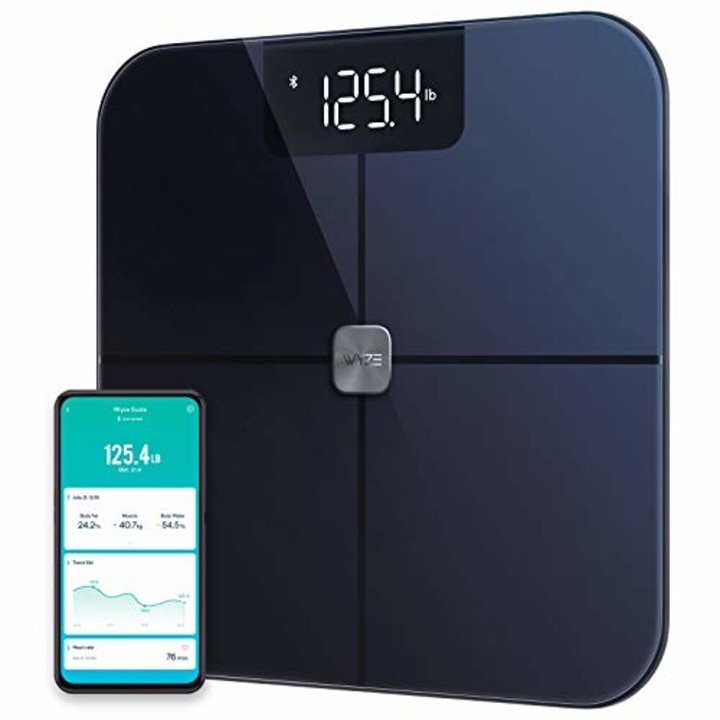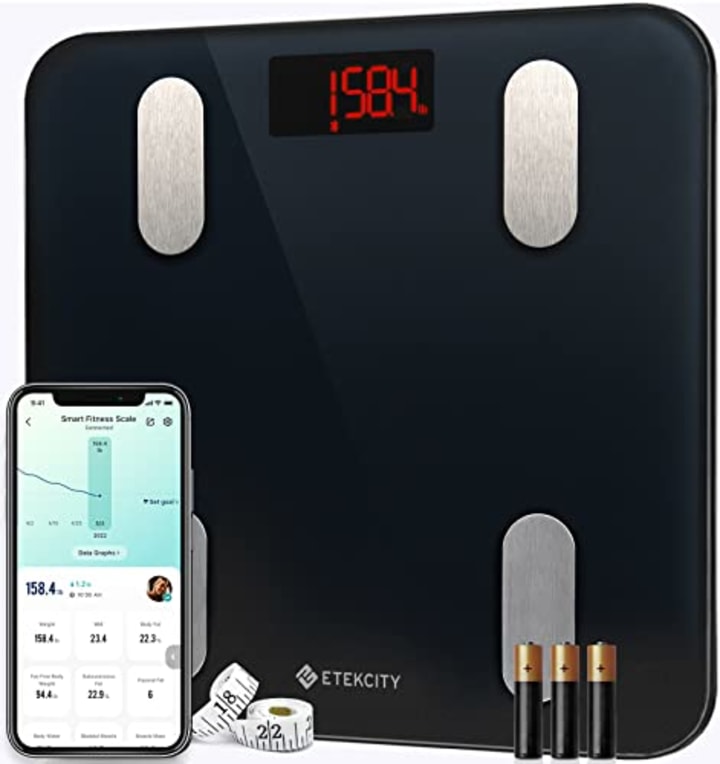If you’re on a journey to getting healthier, tracking your progress can be crucial. But body weight by itself is not an accurate indicator of overall health and well-being: “If you’re only tracking body weight, you are only getting one piece of data about your body,” explained Gbolahan Okubadejo, a spinal and orthopedic surgeon in New York City.
SKIP AHEAD Top-rated smart scales to consider | What is a smart scale? | Should you buy a smart scale?
Smart scales aim to offer a more holistic picture of your health by providing additional metrics, such as body mass index (BMI), body fat percentage, muscle mass and water retention. Some also measure heart rate and oxygen level. “These metrics can be shared electronically with your doctors, personal trainers, nutritionists or anyone else who is helping you to achieve your health goals,” said Dr. Malini Desai, obesity medicine physician at Cleveland Clinic Akron General.
With a number of new smart scales coming on the market each year, featuring their own unique materials and technology, it’s tough to know which model is right for you. To help you decide the best smart scale for you, we reached out to experts to gain insight on the benefits of smart scales, whether they are worth investing in and how to shop for them.
How to shop for a smart scale
Smart scales can run you anywhere from $30 to $200, depending on the number of metrics it can track. Below, we list a few features to consider when deciding which smart scale is right for you, according to our experts.
Health metrics. The most popular scale metrics are weight, body fat and BMI (see below). If there’s a more specific feature you’re interested in, like muscle mass or hydration level, you might have to invest slightly more money.
Compatibility with fitness apps. If you already use a smart tracker, like Apple Health or Google Fit, it makes sense to buy a compatible scale. It will be easier to set up and sync your data, and these scales offer a more holistic health picture when combined with the metrics that your wearable tracks, said Okubadejo. “Since people use their smartphones constantly, having this data linked gives users more of a 360-overview about their health and may keep them more accountable with information that is stored in one place and easy to analyze,” he explained.
Plug in or rechargeable. Most smart scales take four AAA batteries, while others can be plugged into the wall or hold a charge. The former will cost less up front, but will probably cost you more in batteries over the course of its life.
Supports multiple users. If you have a lot of people in your household, then it’s important to find one that can support multiple users. Many smart scales support up to 8 people, and some are unlimited. It’s easy to toggle between them, and some even allow you to have “visitors,” who are not registered with the device.
Weight limit. Keep in mind that some scales have weight limits, typically around 400 pounds.
Top-rated smart scales to consider
Below, we rounded up some top-rated smart scales to consider across various budgets. Each of the following scales is Bluetooth-enabled, allows multiple users, has a weight limit at or near 400 pounds and measures BMI, bone mass, muscle mass and body fat in line with our experts’ guidance.
FitBit Aria Air Smart Scale
Ideal for FitBit users, this smart scale syncs up with your existing data and helps monitor your progress. The scale comes in two colors — black and white — and the brand says it tracks weight and BMI, along with the metrics your wearable FitBit offers, like steps and hydration levels. The scale supports multiple users, according to FitBit, and is powered by three AAA-batteries. While this scale supports other fitness tracking apps, it likely works best with other FitBit products. This smart scale has a 4.4-star average rating from 16,800 ratings on Amazon.
QardioBaseX Wi-Fi Smart Scale and Body Analyzer
The QardioBaseX is an enhanced version of the QardioBase2. It’s made of tempered glass and works on any surface, including carpet. It measures 12 different metrics, including protein, skeletal muscle, water composition, metabolic age and subcutaneous and visceral fat. Up to eight users can use the scale, and it can automatically recognize the person standing on it. The scale can connect via Bluetooth or Wi-Fi and is compatible with the Qardio app. There’s a Visitor Mode for unregistered users, a Pregnant Mode and an Athlete Mode. The scale charges via USB cable, which lasts up to 12 months with one full charge.
RENPHO Smart Body Fat Scale
If you want to start tracking your health without splurging, this affordable scale may be your best bet. It connects to all the major fitness apps, including Google Health, Apple Health and Fitbit, and measures 13 different body metrics, including things like skeletal muscle, protein levels and metabolic age. Data-sync automatically via Bluetooth or Wi-Fi. Renpho’s scales can support multiple accounts, but keep in mind all users have to be under the same app log-in. This is RENPHO’s bestseller in its smart scale category, with a 4.8-star average rating from 33,500 reviews on its site.
Withings Body+ Smart Body Composition
This scale tracks weight, body fat, water retention, bone mass and muscle mass. It can sync with Apple Health, Fitbit and Google Fit — data automatically syncs when your smartphone or wearable connects to Wi-Fi or Bluetooth, according to the brand. Whithings says users can even sync their food tracker, like MyFitnessPal, with the scale. It offers up to eight user profiles and uses AAA batteries that offer a typical battery life of 18 months, the brand says. One key feature of the scale — which has a 4.5-star average rating from 31,900 reviews on Amazon — is its display of the daily weather report and previous day’s steps.
Wyze Scale Bluetooth Body Fat Scale
Wyze, a smart technology company known for their smart bulbs, makes an affordable scale that offers a variety of body measurements, including fat percentage, heart rate and basal metabolic rate. It syncs with both the Wyze app and other popular fitness apps like Apple Health and Google Fit. The brand says it can host up to eight user profiles, and also has “guest mode” for an unlimited number of weightings. Data syncs automatically and can easily connect to your smartphone via Bluetooth, according to Wyze. This scale takes four AAA batteries and has a 4.7-star average rating among 23,400 reviews on Amazon.
Etekcity Smart Scale
The budget-friendly Etekcity smart scale can sync your data with a number of health-tracking apps, including Apple Health, Google Fit, FitBit, MyFitnessPal and Samsung Health, or you can pair your scale with the free VeSync app via Bluetooth, according to the brand. It has a 400-pound capacity and provides 13 biometrics, including body fat, muscle mass, BMI, visceral fat, subcutaneous fat, skeletal muscle, water retention and protein, Etekcity says. It earned a 4.7-star average rating from 68,500 reviews.
What is a smart scale?
Smart scales are rising in popularity. In fact, revenue in the smart scales sector is projected to reach $3.8 billion in 2023. The reason: People are increasingly becoming more aware that monitoring weight and body composition metrics can help lower your risk of diabetes, heart disease and some cancers, according to Desai.
Smart scales work by sending a non-invasive electrical impulse, called bioelectrical impedance, through your feet to gather a variety of health metrics, which are then sent via Wi-Fi to a fitness app on your smartphone or other fitness tracker to track your progress over the course of the day, week, month, year and so on. Some smart scales, like the QardioBaseX, sync with their own apps, and some are compatible with both their apps and Google Fit or Apple Health.
Our experts noted that smart scales can measure some or all of the following health metrics:
Body fat percentage, the amount of body fat you have compared to lean tissue.
Body mass index (BMI), a calculation that determines if the user is at a healthy weight.
Water retention, a measure of how hydrated you are.
Basal metabolic rate, which determines energy levels and lets the user know how many calories they need to consume to maintain, lose or gain weight.
Subcutaneous fat, or the percentage of fat below the skin.
Metabolic age, or how old your body is, based on basal metabolic rate.
Bone density, a measurement of the amount of minerals in a certain volume of bone.
Scales that offer only one or two metrics don’t give your full health picture. For example, BMI is a common gauge of individual health, but it only takes into consideration total body mass relative to height. Someone with a high lean body mass — which is the weight of muscles, organs, bones and other elements of the body — may be classified as overweight by their BMI, despite having low body fat, Hales explained. That can be “discouraging” to those trying to improve their weight and health, she said.
Should you buy a smart scale?
If you are motivated by data tracking or need to share your metrics with your health-care provider on a regular basis, you may be a good candidate for a smart scale, said Desai. However, she added that beyond measuring weight, no smart scale is completely accurate. Instead, these metric calculations are just a rough estimate. “A combination of all the metrics together can help give insight into the full picture of your health, and it’s important to note that the absolute measurements on the scale may not always be as important as the trends,” said Desai. These trends, she said, can help track your overall progress.
Tracking multiple health metrics can also make some individuals feel more in control of their lifestyle and health habits, which may empower them to continue, said Dr. Robert Kushner, a professor of medicine at Northwestern School of Medicine.
Understanding the limitations of these measurements is a good first step, as is looking at them holistically. For example, if your BMI is slightly high but you have a healthy fat percentage, that could be a good indicator you’re on the right track, Hales said. Health metrics other than weight and BMI, like bone mass or fluid retention, are likewise important for various health conditions.
To ensure you get an accurate reading, Hales recommended placing your scale on a hard, flat surface and stepping on and off the scale a few times to make sure its sensors are consistent.
Meet our experts
At Select, we work with experts who have specialized knowledge and authority based on relevant training and/or experience. We also take steps to ensure that all expert advice and recommendations are made independently and with no undisclosed financial conflicts of interest.
Gbolahan Okubadejo is a spinal and orthopedic surgeon in New York City.
Dr. Malini Desai is an obesity medicine physician at Cleveland Clinic Akron General.
Dr. Robert Kushner is a professor of medicine at Northwestern School of Medicine.
Sarah Hales is assistant professor with a focus in weight management at the Medical University of South Carolina.
Catch up on Select's in-depth coverage of personal finance, tech and tools, wellness and more, and follow us on Facebook, Instagram and Twitter to stay up to date.
